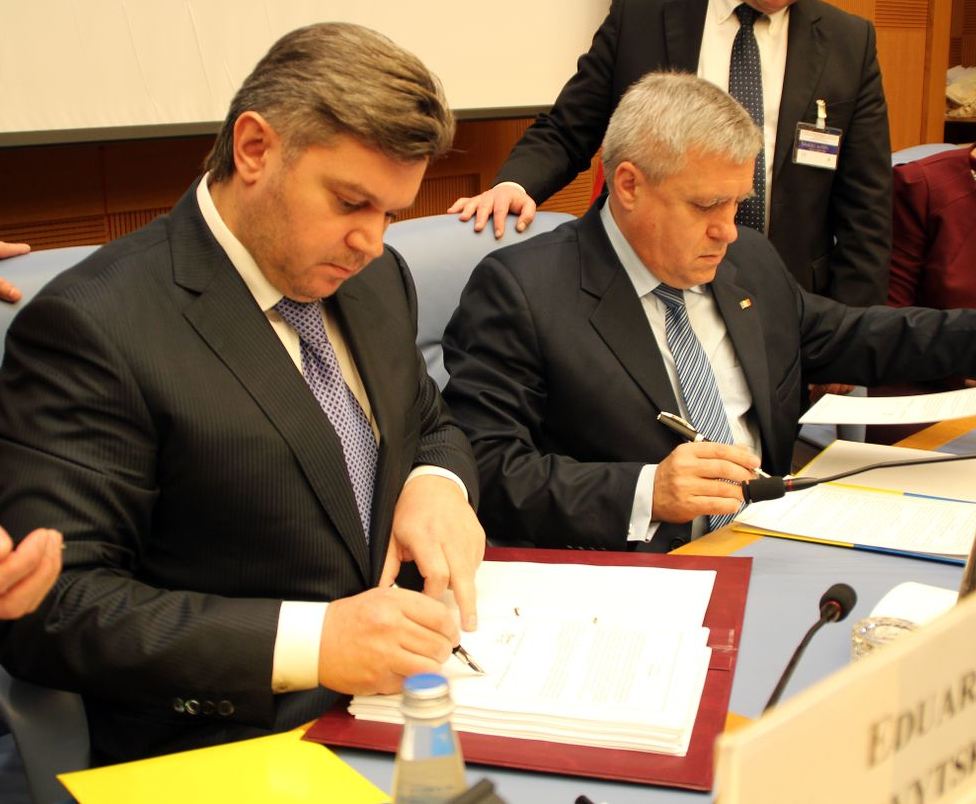
On 29 November the Minister of Environment of the Republic of Moldova, Mr. Gheorge Salaru, and the Minister of Ecology and Natural Resources of Ukraine, Mr. Eduard Stavytskyi, signed the bilateral Treaty on Cooperation on the Conservation and Sustainable Development of the Dniester River Basin. The signing ceremony took place in the Italian Parliament during the Meeting of the Parties to the United Nations Economic Commission for Europe (UNECE) Convention on the Protection and Use of Transboundary Watercourses and International Lakes (Water Convention).
The new Treaty identifies principles and provides a framework for cooperation on water pollution prevention and control, water flow regulation, conservation of biodiversity and protection of the Black Sea environment. It also addresses the monitoring of data exchange, public participation and cooperation in emergency situations.
The Treaty is a pioneering example for the region in the post-Soviet era. It significantly broadens the existing cooperation arrangements to cover the entire river basin and all sectors important for the management and protection of the shared waters. The Treaty establishes the bilateral Dniester Commission to facilitate sustainable use and protection of the Basin. It is an important step in the implementation by the Republic of Moldova and Ukraine of their obligations under the UNECE Water Convention.
The enhanced cooperation of the two countries, including the drafting and negotiation of the Treaty, have been supported by the Environment and Security Initiative through a series of Dniester projects jointly managed by UNECE, the Organization for Security and Cooperation in Europe and the United Nations Environment Programme. The signing is the result of eight years of step-by-step development of cooperation involving a broad range of stakeholders from both countries, including the Transnistria region of the Republic of Moldova.
The 1,362-kilometre-long Dniester River is one of the largest Eastern European rivers. It starts in the Carpathian mountains in Ukraine, flows through the Republic of Moldova and then re-enters Ukraine where it discharges into the Black Sea. In addition to supplying drinking water for a large part of the basin, including the major city of Odessa (Ukraine), hydropower generation and fisheries are other important sectors the river serves.
Expeditions funded by the Dniester-III project indicate severe water quality problems, declining biodiversity and deteriorating ecosystems along the river. The impacts of climate change, such as increasingly frequent and devastating floods are already felt in the basin. The signing of the Treaty as a basis for improved transboundary cooperation between the two countries is a very timely response to these challenges.
For further information please visit: http://www.unece.org/env/water/eeurope.html, or contact:
Mr. Bo Libert
UNECE
Phone: +41 (0)22 917 2396
E-mail: [email protected]
Mr. Raul Daussa
OSCE
Phone: +43 (1) 514 36 6237
E-mail: [email protected]
Wondwosen (Wondy) K. Asnake
UNEP
Regional Office for Europe
Phone: +41 (0)22 917 8158
E-mail: [email protected]
Note to Editors:
The UNECE Water Convention is an important legal framework for sustainable management of transboundary surface waters and groundwaters. Currently, 38 countries (including the Republic of Moldova and Ukraine) and the European Union are Parties to the Convention.
The Dniester-I (2004–2006), Dniester-II (2006–2007) and Dniester-III (2009–2011) projects have supported the development of the transboundary cooperation on the Dniester River Basin, including the involvement of institutions in Transnistria. The first two projects assisted the Republic of Moldova and Ukraine in the development of a diagnostic study of the transboundary issues in the basin and the joint Action Programme. The Dniester-III project assisted the two Governments in the development and negotiations of the Dniester Treaty. In addition to the Treaty, the achievements of the Dniester projects include improved cooperation and coordination between health authorities in the region responsible for the quality of drinking water; establishment of transboundary cooperation on biodiversity including the management of fish stocks; improved sharing and management of information on the basin; and increased awareness among stakeholders and the public about the value of the water resources in the Dniester Basin and the threats they face. An on-going component aims to reduce vulnerability to floods. The Dniester projects are jointly managed by the Organization for Security and Cooperation in Europe (OSCE), the United Nations Environment Programme (UNEP) and UNECE as part of the Environment and Security Initiative, with financial support from the Governments of Finland and Sweden.
The Environment and Security Initiative (ENVSEC) (see http://www.envsec.org) was established in 2003 and includes OSCE, the Regional Environmental Centre for Central and Eastern Europe, the United Nations Development Programme, UNECE and UNEP. ENVSEC works to assess and address environmental problems, which threaten or are perceived to threaten security, societal stability and peace, human health and/or sustainable livelihoods within and across national borders in conflict prone regions.
UNEP in collaboration with partners, UN collaborators, NGOs, universities, governments carries out comprehensive assessments of the world's water resources and promotes sustainable use of water resources.
The fifth edition of the Global Environmental Outlook (GEO-5), launched on the eve of the Rio+20 Summit, also highlights the importance of transboundary water cooperation. GEO-5 points out about 158 of the 263 international freshwater basins still lack cooperative management frameworks and make the case for the development of integrated water management and monitoring tools to better manage current and future water challenges.
For further information on water chapter of the GEO-5 please visit: http://www.unep.org/geo/pdfs/geo5/GEO5_report_C4.pdf